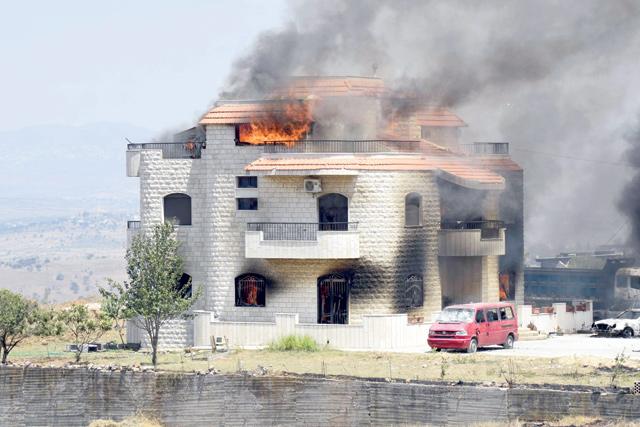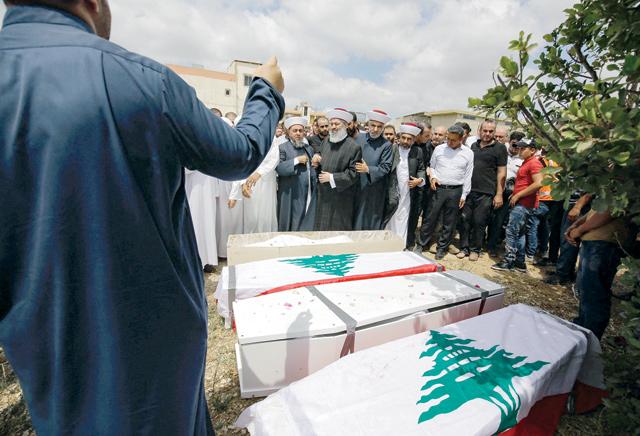You are here
Crisis-hit Lebanon reels from latest deadly explosion
By AFP - Aug 16,2021 - Last updated at Aug 16,2021

Smoke billows from the reported home of the lot owner, where the exploded fuel tank was placed, in the village of Tlel in Lebanon's northern region of Akkar on Sunday (AFP photo)
BEIRUT — Lebanon reeled Monday from a deadly explosion that burned alive people desperate to fill plastic containers with fuel in a country sinking ever deeper into darkness and chaos.
At least 28 people were killed when the fuel tank, which was swarmed by residents clamouring to fill their vehicles amid crippling shortages, blew up early on Sunday in the northern region of Akkar.
The latest tragedy to befall Lebanon comes as the country grapples with an economic crisis described by the World Bank as one of the world's worst since the 1850s.
Nearly 80 people were also injured in the blast, many of them with burns that further overwhelmed hospitals struggling to function without electricity, medics said.
On Monday, foreign countries and UN agencies were scrambling emergency aid to help exhausted health workers cope with the new influx of serious injuries and run DNA tests on the charred remains of the dead.
A health ministry official told AFP that authorities were still sorting through bagfuls of remains to determine a final death count.
Shortages of key commodities have accelerated in recent days, leaving much of Lebanon struggling to source fuel, gas and even bread, with buying power pummelled by the currency losing more than 90 per cent of its value on the black market.
The country's 6 million inhabitants now fear the internet and drinking water will be next to disappear.
The blast in Akkar, one of the most impoverished parts of the country, was a deadly direct consequence of a vicious cycle fast turning Lebanon, once a regional beacon of modernity, into a failed state.
The scenes of horror piled trauma on a country still coming to terms with last year’s cataclysmic Beirut Port explosion that killed more than 200 people and disfigured the city.
‘Need to leave’
In Tripoli’s Al Salam hospital, which received the bulk of patients burned by the Akkar blast, 23-year-old Iqaz Saqr could not hold back tears.
Her husband and a brother, a 20-year-old livestock farmer named Abdul Rahman, were both caught in the explosion.
Abdul Rahman was left battling for his life.
“My brother was out of gasoline. He just needed a small amount so he could go and get boxes of feed for his sheep,” Iqaz told AFP.
“My husband too just wanted gasoline so he could ... provide for me and our daughter.”
Across the country, with no more than two hours a day of mains electricity supply, many shops and restaurants remain closed, unable to source fuel for their generators.
Many private and public sector employees have been told to stay home and most of the rest have often been doing the same for lack of transport options.
Stuck in an endless queue of cars at a Beirut petrol station, Mohammed, who did not want to give his full name, said he could see no light at the end of the tunnel.
“We need to leave Lebanon. We all need to get out,” said the 30-year-old engineer. “God help those who stay.”
The state has declared a national day of mourning over the Akkar blast, a move unlikely to offer much solace to a population that blamed those very authorities for the tragedy.
‘I’m scared’
Angry protesters on Sunday torched the home of the landowner on whose plot the tragedy unfolded, accusing him of involvement in a hoarding and smuggling scheme allegedly covered up by top officials.
Gas station owners have been accused of hoarding fuel ahead of an expected price hike, causing crippling shortages and spawning a ruthless black market that is enriching a small cartel and choking the rest of the country.
A few dozen people protested on Sunday in front of the Beirut home of Najib Mikati, who was recently appointed prime minister-designate.
The country’s richest man is the third person to attempt to form a government since the aftermath of the Beirut Port blast last August since when ministers have served only in a caretaker capacity.
After meeting President Michel Aoun on Monday, Mikati said efforts were still underway to form a new government.
The lack of a government is freezing international assistance that could help dig Lebanon out of the abyss.
As every aspect of daily life unravels, sometimes deadly scuffles have broken out at petrol stations and residents across the country fear for their safety.
“I feel like crying about everything,” said Farah, a 21-year living in the mountainous Chouf region.
“I’m scared we’ll get to the point where we can’t leave this country, even from the airport... We only have the sea left. I feel we’ll drown trying to get out,” she said.
Related Articles
BEIRUT — A fuel tank blast in Lebanon early on Sunday killed 28 people and injured nearly 80, authorities and medics said, burning a crowd c
AL-DAOUSEH, Lebanon — Families laid to rest Wednesday victims of a fuel tank blast that killed at least 28 people in northern Lebanon amid a
BEIRUT — Hospitals in the Akkar region of north Lebanon where a fuel tank explosion killed at least 28 people this week struggled to operate














